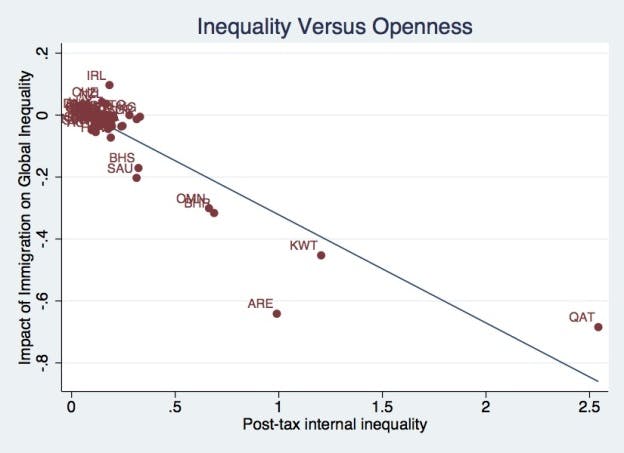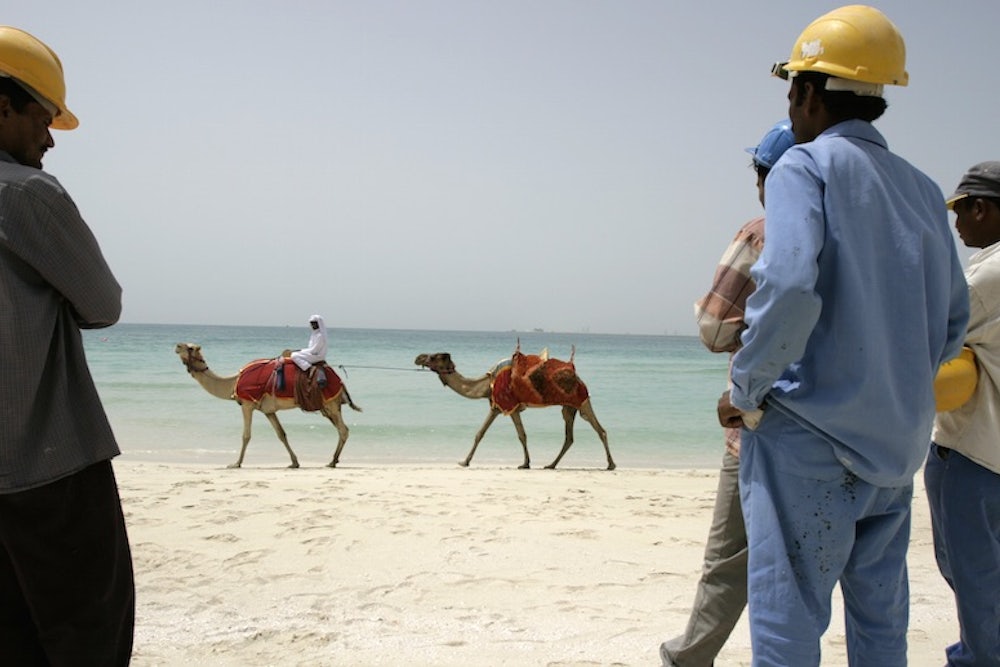Last month, in a speech in Boston, Federal Reserve Chair Janet Yellen provoked some grumbling from conservatives when she said, “The extent and continuing increase in inequality in the United States greatly concern me…. I think it is appropriate to ask whether this trend is compatible with values rooted in our nation’s history, among them the high value Americans have traditionally placed on equality of opportunity.” But she is hardly alone in her concerns. Since at least Occupy Wall Street, income inequality has been one of the most intensely debated issues in American politics. Commentators fret that rising inequality hurts the poor, gives the rich the upper hand in politics, and will create a caste system in the United States. Proposed solutions range from the practical but weak, like raising the minimum wage, to the fanciful, like Thomas Piketty’s global wealth tax.
But the most powerful force to reduce inequality worldwide has gone largely unrecognized by the West, even though their value has been proven in the Gulf nations: open migration laws that are coupled, paradoxically, with caste systems.
The first thing to understand is that inequality is a much more severe problem across borders than within countries. In the United States, the median household makes around $50,000 per year and those in the top one percent make on average $300,000-$400,000. But even the poor in the United States are well-off compared to the poor in most other countries. The poorest five percent of Americans make about $3,000-$4,000 per year. This amount exceeds the per-person earnings of 60 percent of the global population. Around the world, more than a billion people live on a dollar a day.
So if you care about inequality, you should care about global inequality. Is there anything that can be done about it? One view is that we in the rich countries should make donations to poor people in other countries. Researchers, including the two of us, have different views about whether such aid would be effective or desirable. Some argue that we’d lose much of the aid to waste and corruption. Yet even if foreign aid would be useful, it seems unlikely that rich countries will ever voluntarily contribute enough to dent global inequality.
The major approach of the West to international justice has been through its commitment to human rights. Western countries have ratified human rights treaties and created international institutions like the U.N. Human Rights Council with the purpose of creating a legal framework that compels the governments of all countries to respect the rights of their citizens. While the treaty regime does not explicitly address inequality, it does require countries to guarantee health care, fair wages, pensions, and education.
But this system, which has been in place for decades, has failed to stop widening inequality within countries, and has done little to improve the rights of people, as one of us argues in a new book. The largest contribution to human well-being in the last few decades has come not from the U.S. or Europe but from China, whose authoritarian government has engineered massive economic growth for its poor populace, and from authoritarian countries in the Persian Gulf.
The countries in the Gulf Cooperation Council (GCC)—Bahrain, Kuwait, Oman, Qatar, Saudi Arabia, and the United Arab Emirates (UAE)—are not known for their humanitarianism. They are authoritarian Islamic states that sit on huge pools of oil, and they’re also among the most unequal in the world. About 85 percent of the population of the UAE, for example, consists of migrant workers living on roughly $5,000 per year. Fifteen percent of the population are Emirati nationals, who live on roughly three hundred thousand dollars a year, implying greater economic inequality than existed even in Apartheid South Africa or the antebellum South.
But these foreign migrant workers earn vastly more in the GCC nations than they would at home in Bangladesh or India, where they would make around $1,000 per year. By welcoming migrant workers, the UAE and its neighbor Qatar do more than any other rich country to reduce global inequality. Through migration, Qatar’s per-person contribution to the reduction in global inequality is almost three times that which would be achieved by eliminating all inequality in the United States, and many times that created by taxes and transfers in any of the rich countries that belong to the Organization for Economic Co-operation and Development (OECD), according to calculations by one of us. If you take into account remittances—in UAE, for example, migrant workers send home more than 75 percent of their salary—the reduction in inequality is even greater.
Migration has such large benefits because people in poor countries start from such a low base. If you give $4,000 to someone who earns only $1,000, that person’s income increases fivefold, dramatically reducing inequality. If you give the same amount to a poor person in the United States making $12,000, the donation would increase his or her income only by a third. In fact, increasing the income of a truly poor person in a poor country by a factor of five is precisely what would allow her access to the basic goods, like education and health, that are the empty promises of human rights treaties. This is why helping the poorest people in the world does so much more to reduce global inequality than do the welfare states of OECD countries, where money is shuffled around between the super-rich and (by global standards) the not-so-poor.
This is not to say that migrant workers in GCC have it easy—not by any stretch. Those in monarchical Qatar, for instance, do not enjoy even the limited rights of Qatari nationals. But reducing inequality will require uncomfortable tradeoffs. Qatar would not welcome so many migrant workers if it had to give them generous political and civil rights; in fact, Gulf states explicitly seek non-Arab, dark-skinned migrants so as to minimize the risk that nationals will sympathize, fraternize, or intermarry with migrants (who would then demand permanent residence, if not citizenship). Indeed, almost all of the massive historical migrations from poor to rich countries have occurred on such economically and politically unequal terms.
The following graph illustrates Gulf countries’ contributions to reducing global inequality. The horizontal axis shows inequality, measured by the social benefit of eliminating inequality, within countries; the vertical axis shows the extent to which a country, through its migration policies, reduces global inequality.

The blob in the upper-left corner is composed of rich OECD countries, which all have relatively low inequality within their borders (by global standards) but whose foreign aid contributes very little to reducing global inequality. The dots strung out to the right are Gulf nations with high internal inequality that, through migration, have made massive contributions to reducing global inequality. To be clear: Even countries like Norway, known for their internal equality and peacekeeping contributions to foreign countries, make a minor dent in global inequality.
If the OECD countries copied the migration policies of the GCC countries, they would reduce global inequality by much more than their welfare systems do within their borders. For example, if OECD countries welcomed migrants in proportion to their GDP at the same rate and from the same poor nations as Qatar does, this would reduce global inequality by about twice the amount that eliminating all internal inequality in the OECD countries would—and by twice the rate that taxes and transfers in these countries reduce global inequality. If they adopted the same per-citizen rate at which the UAE takes migrants, they could accomplish much more. By taking in the 60 percent of the global population who make less than the bottom five percent in the United States and paying them $5,000 per year, the U.S. and Europe would reduce global inequality by roughly a third.
We citizens of OECD countries take pride in our political and civil rights, and our generous welfare systems. Yet we maintain our high standard of living by giving no rights and trivial money to people who live outside our arbitrary borders. While we fuss over whether we should raise or lower our marginal tax rates, we ignore the plight of the most desperate people in the world. And yet we are surprised that leaders of China and the GCC accuse us of hypocrisy when we criticize their records on human rights.
Idealists might argue that vast foreign aid is a politically feasible way to reduce inequality, or that rich countries really could be persuaded to welcome the poorest migrants with full political equality. We hope they are right, as there are plenty of harsh and apparently capricious aspects of the GCC regimes, including the practice of allowing employers to take possession of workers’ passports, which potentially enables them to block workers from leaving the country. But the many unappealing aspects of the system—the migrants’ limited economic, political, and social rights, their segregation from the citizenry, and an authoritarian enforcement regime—seem necessary to maintain political support for the migration policies that help to reduce global inequality. (There are, of course, many other unsavory aspects to these regimes, like the oppression of women and LGBT people, that no nation should imitate. But those issues bear no relationship to the open immigration policies we’re proposing.)
Intellectuals and leaders in OECD countries need to think carefully, and in a politically realistic way, about how to reconcile their commitments to rights and the agenda of reducing inequality. The GCC model of accepting migrants on economically and politically subordinate terms, though not humanitarian on its face, has proven so in practice. If this model were adopted in rich countries, then inequality—both political and economic—would dramatically increase within our own societies. This could undermine some of the liberal character we all prize, and it would certainly make all of us even more uncomfortable about inequality than we already are. But the benefits for the world’s poorest people would be vast.
